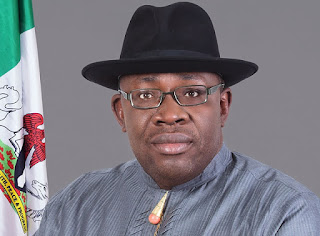Banks grumble as Bayelsa civil servants can’t repay loans
The decision by Bayelsa State Governor, Seriake Dickson, to pay civil
servants half of their April salaries in cash and cheques has drawn the
anger of some banks in the state, it has been learnt.
Investigation has revealed that instead of paying the civil servants through their various bank accounts, Dickson opted for cash and cheque payment.
The development, it was learnt, was apparently to avoid deductions of workers’ financial liabilities by their various banks.
Bayelsa State has been in the throes of hardship due to the inability of the government to pay backlog of salaries it owed different categories of workers in the state.
The government is owing civil servants five months, local government workers about 13 months and pensioners about eight months.
It was learnt that civil servants went to their various pay points in their ministries to collect half of April salaries by cash and in cheques on Tuesday morning.
One of the civil servants, who did not want her name in print, said she collected half of her one month’s salary in cash, lamenting that the money was grossly inadequate.
“I went to my pay point and I was given just half of one month. In fact, I was paid half of April salary. I am confused because I don’t know when other arrears will be paid. We have not received salary since January,” she said.
She confirmed that some ministries issued cheques to their workers, adding that the government moved cash to ministries’ accounts and asked them to withdraw the money and pay the workers in cash.
She admitted that workers were owing banks huge sums of unserviced loans arising from months of unpaid salaries.
It was gathered that by paying cash to the workers, the government had pitted them (civil servants) against their banks.
A bank manager, who spoke on condition of anonymity, said the development was a violation of an agreement the banks reached with the workers’ unions and the government.
He said in several meetings, the banks and organised labour unions worked out modalities and new percentages of deductions before the half salary was paid.
The banker said, “We held many meetings with government’s representatives and labour unions. Initially when full salaries were paid, we used to deduct 50 per cent to service liabilities of the civil servants.
“But based on the prevailing economic problems in the state, we agreed that when the half salaries are paid, we will apply 33 per cent of deductions for the liabilities. We were shocked to notice that the agreement has been breached.
“Instead, the government decided to be paying cash to our customers. It is affecting our cash flow but for now, we are still watching”.
He said there would be punishment for default unless the workers on their own return the 33 per cent of the money to service various loans they collected.
Investigation has revealed that instead of paying the civil servants through their various bank accounts, Dickson opted for cash and cheque payment.
The development, it was learnt, was apparently to avoid deductions of workers’ financial liabilities by their various banks.
Bayelsa State has been in the throes of hardship due to the inability of the government to pay backlog of salaries it owed different categories of workers in the state.
The government is owing civil servants five months, local government workers about 13 months and pensioners about eight months.
It was learnt that civil servants went to their various pay points in their ministries to collect half of April salaries by cash and in cheques on Tuesday morning.
One of the civil servants, who did not want her name in print, said she collected half of her one month’s salary in cash, lamenting that the money was grossly inadequate.
“I went to my pay point and I was given just half of one month. In fact, I was paid half of April salary. I am confused because I don’t know when other arrears will be paid. We have not received salary since January,” she said.
She confirmed that some ministries issued cheques to their workers, adding that the government moved cash to ministries’ accounts and asked them to withdraw the money and pay the workers in cash.
She admitted that workers were owing banks huge sums of unserviced loans arising from months of unpaid salaries.
It was gathered that by paying cash to the workers, the government had pitted them (civil servants) against their banks.
A bank manager, who spoke on condition of anonymity, said the development was a violation of an agreement the banks reached with the workers’ unions and the government.
He said in several meetings, the banks and organised labour unions worked out modalities and new percentages of deductions before the half salary was paid.
The banker said, “We held many meetings with government’s representatives and labour unions. Initially when full salaries were paid, we used to deduct 50 per cent to service liabilities of the civil servants.
“But based on the prevailing economic problems in the state, we agreed that when the half salaries are paid, we will apply 33 per cent of deductions for the liabilities. We were shocked to notice that the agreement has been breached.
“Instead, the government decided to be paying cash to our customers. It is affecting our cash flow but for now, we are still watching”.
He said there would be punishment for default unless the workers on their own return the 33 per cent of the money to service various loans they collected.




Comments
Post a Comment